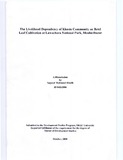The livelihood dependency of Khasia community on betel leaf cultivation at Lawachara National park, Moulavibazar

View/Open
Date
2008-10Publisher
BRAC UniversityAuthor
Riadh, Sayeed MahmudMetadata
Show full item recordAbstract
Declaration of an area as "protected" is known to threaten the livelihoods of forest dependent communities. In Bangladesh - as in most developing countries - the livelihoods of forest dwellers are largely dependant on forest resources, particularly non-timber forest products (NTFPs). It proves a challenge for management authorities’ to reconcile the need for the protection with the recognition of the livelihood dependencies of local communities.
In Lawachara National Park, Khasia communities are largely dependent on forest-based betel leaf cultivation. This study analyzes the livelihood dependency of Khasia communities on betel leaf cultivation in Lawachara National Park. This study utilized anin-depth questionnaire, focus group discussions, and a thorough literature review.
Irrespective of their socioeconomic status, this research shows that both richer and poorer households are highly dependent on betel leaf cultivation. This suggests that the education levels of the Khasia community in LNP has not yet reached a level that can provide them with alternative livelihood opportunities. Another significant finding of the research is that the gender distribution of betel leaf cultivation empowers women financially as well as socially. Input supports and market access were identified as major obstacles to betel leaf cultivation. Due to declining soil fertility, the Khasia community has had to use chemical fertilizers in their Jhum (betel gardens). Though traditionally mulching was used as a manure source, this shift has in turn created a demand for irrigation. Due to the increased cost of inputs, the profitability has declined. As a tribal community the Khasias are marginalized, implying insufficient market access and unfair prices. As a result, their dependency on the forest cannot be reduced by increased incomes. Since forest-based betel leaf cultivation offers a high potential for the generation of cash incomes for the Khasia communities living within park boundaries, the recently introduced co-management approach must properly address this issue.
